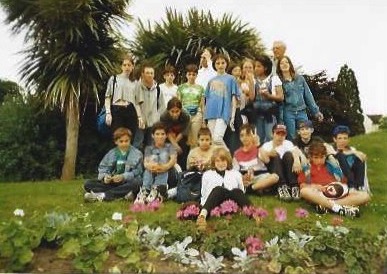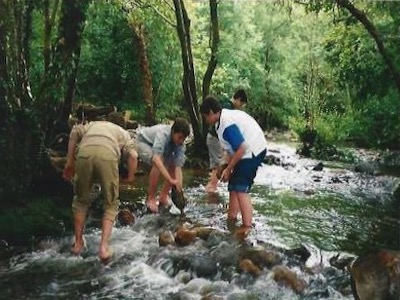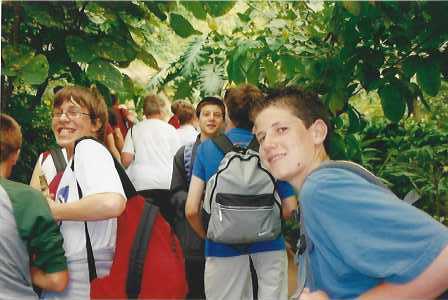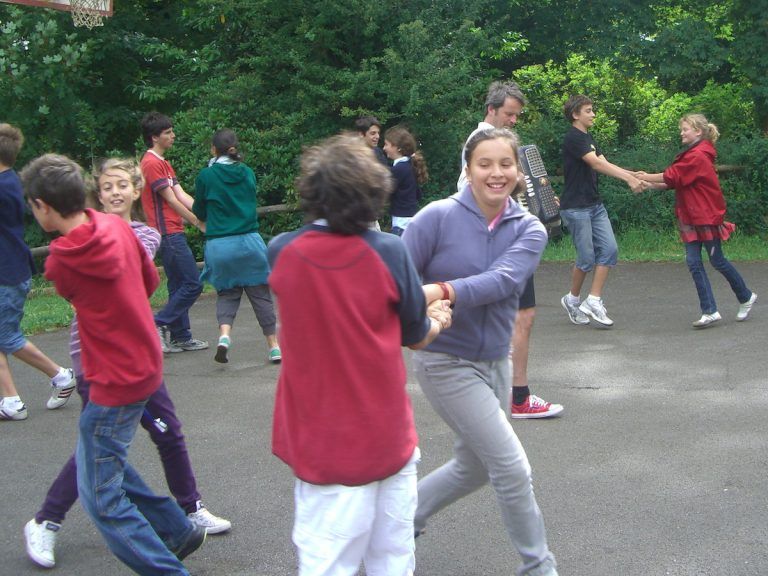Learning by doing
Drama and visual arts appeared to be the most effective for our purposes. Drama facilitates communications and social interactions thanks its multiple range of verbal and non-verbal languages.
Visual arts helps young learners cross the special bridge between images and meaning that is often a real barrier for everyone who is not enough confident with a foreign language.
Other activities were selected in relation to their educational significance and also to the available Human Resources in the local community.
With great surprise I discovered that the small area near Dartington-Totnes -where I arrived somehow “accidentally” in 1998- offered an abundance of talented artists, craft-workers, pottery makers, dance tutors, musicians and other professionals who were quite happy to get involved.
So, here we go! folk dances with various tutors, leather work with John, pottery and modelling with Chieco first then other artists, archery with Tony, canoeing also with John, circus skills with Duncan, scone-baking with Louise were the most popular activities in the early years. Later on we introduced creative music with Adrian and Taiko with Jonathan and his team.
Over time tutors and teachers varied and so the activities, depending on their availability and on other available Human Resources.
Local cultural events -such as musicals, comedies, festivals- and outings to significant sites -such as Start Point, River Dart Country Park and Woodlands Family Park in Devon or Eden Project, Minack Theatre, Tintagel in Cornwall- entered our regular summer schedule and offered our pupils a hint of the English culture and life-style.
Learning with joy
The final outcome of such an intense, enjoyable programme was to spark enthusiasm, interest, active participation. Our pupils consistently expressed their wish to continue learning and improving their English! Some of our summer pupils decided to come and study in England. Others said, they wanted to live here in the future.
In fact a child can learn more or less in a certain timespan but keeping alive the joy and wish of learning was the best result we could ever dream of! In fact a child can learn more or less in a certain timespan but feeding the joy of learning is a gift for life!
Over time tutors and teachers varied and so the activities, depending on their availability and on other available Human Resources.
Learning from real life
Local cultural events -such as musicals, comedies, festivals- and outings to significant sites -such as Start Point, River Dart Country Park and Woodlands Family Park in Devon or Eden Project, Minack Theatre, Tintagel in Cornwall- entered our regular summer schedule and offered our pupils a hint of the English culture and life-style.
The final outcome of such an intense, enjoyable programme was to spark enthusiasm, interest, active participation. Our pupils consistently expressed their wish to continue learning and improving their English! Some of our summer pupils decided to come and study in England. Others said, they wanted to live here in the future: and many did!
In fact a child can learn more or less in a certain timespan but keeping alive the joy of learning is the best result we could ever dream of!
Feeding the joy of learning is a deep gratification for a teacher!
To my a teachers I’m deeply grateful as they gave me a gift for life!







